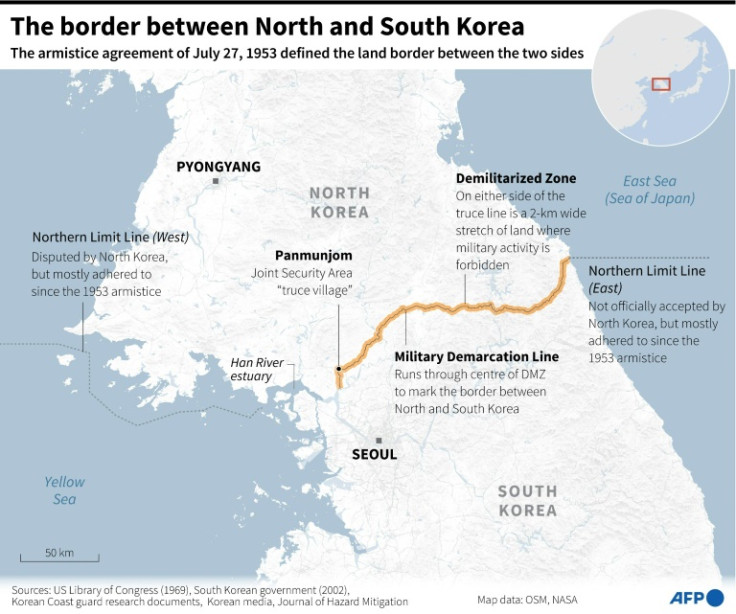S. Korea Fires Warning Shots After N. Korea Soldiers Briefly Cross Border

South Korean troops fired warning shots after North Korean soldiers briefly crossed the border this week, Seoul's military said Tuesday, with tensions high over Pyongyang's trash-carrying balloons and the South's retaliatory loudspeaker campaign.
The Sunday incursion over the line separating the two militaries took place in an overgrown area of the heavily fortified border area and was likely accidental, the Joint Chiefs of Staff said.
Relations between the two Koreas -- technically still at war as the 1950-1953 conflict ended in an armistice rather than a peace treaty -- are at one of their lowest points in years.
"Some North Korean soldiers working within the DMZ on the central front briefly crossed the Military Demarcation Line (MDL)," the JCS said in a statement, referring to the line of control between the two Koreas.
"After our military issued warning broadcasts and warning shots, they retreated northward," it said, adding there had been "no unusual movements observed" subsequently.
The incursion was likely accidental, Joint Chiefs of Staff spokesperson Lee Sung-joon told reporters Tuesday.
"The situation at that time was that the DMZ was now overgrown with trees and the MDL mark was not clearly visible," Lee said.
"There was no road, and the (North Korean soldiers) were moving through the bushes, and we were observing (them) even before they got close to the MDL," Lee said.
"We believe that they did not intend to invade, considering that they immediately moved northward after the warning broadcasts and warning shots."
In recent weeks, North Korea has sent more than a thousand balloons laden with trash such as cigarette butts and toilet paper southward, a response, it says, to balloons carrying anti-Pyongyang propaganda sent north by activists.
In response, the South Korean government has suspended a 2018 tension-reducing military deal and restarted loudspeaker propaganda broadcasts along the border, infuriating the North, which warned Seoul was creating "a new crisis".
North Korea may also be re-installing its own loudspeakers along the border, Seoul's military said Monday, a tactic it has used since the 1960s, typically broadcasting praise of the ruling Kim family. They suspended the campaign in 2018 as ties briefly warmed.
The North has also been seen removing street lights from the few roads that once connected the two Koreas in recent months as well as apparently demolishing sections of the inter-Korean railway, the Yonhap news agency has reported.
The incursion of the North Korean soldiers could be a "small provocation" to test the waters ahead of a bigger move, Ahn Chan-il, a defector-turned-researcher who runs the World Institute for North Korea Studies, told AFP.
"It can also be seen as part of (leader Kim Jong Un's sister and chief regime spokeswoman) Kim Yo Jong's preparation for what she described as a 'new countermeasures'" he added.
Experts have warned that the decision to jettison the 2018 deal and restart loudspeaker broadcasts could have serious implications, as previous tit-for-tat propaganda actions have had real-world consequences for inter-Korean relations.
In 2020, Pyongyang, blaming anti-North leaflets, unilaterally cut off all official military and political communication links with the South, and blew up an inter-Korean liaison office on its side of the border.
Pyongyang has also previously threatened artillery strikes against the loudspeaker units.
In 2018, during a period of improved relations, the leaders of the two Koreas agreed to "completely cease all hostile acts", including stopping the leaflets.
The South Korean parliament passed a law in 2020 criminalising sending leaflets to the North, but activists did not stop, and the law was struck down by the Constitutional Court last year as an undue limitation on free speech.
The 2018 pact was a hallmark achievement of former president Moon Jae-in, who met with Kim Jong Un repeatedly in a bid to improve ties.
Abandoning the deal also enables South Korea to resume live-fire drills along the border.
© Copyright AFP 2024. All rights reserved.











